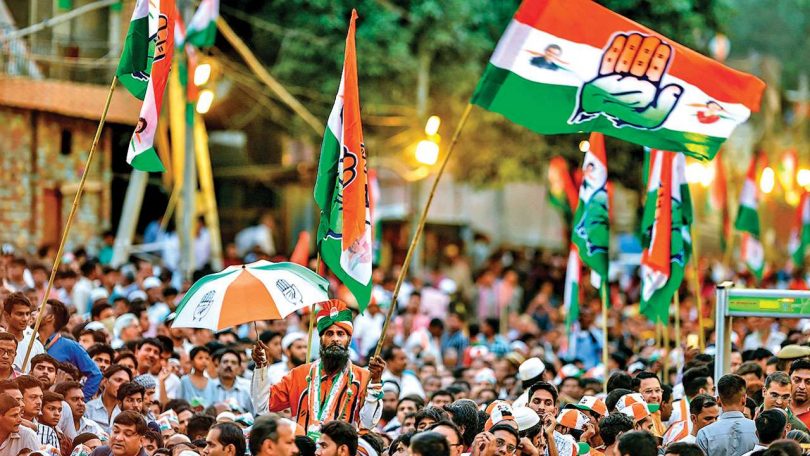This week, in a sign of the internal turmoil in Kerala’s leading opposition party, black flags fluttered outside the Congress state headquarters in Thiruvananthapuram and the Pathanamthitta district Congress committee office.
The turmoil was also reflected in senior party leaders, including Oommen Chandy and Ramesh Chennithala, expressing their concerns over the appointments at different levels in the state Congress. This resulted in a series of disciplinary actions and resignations.
Amid escalating infighting, emotions were out in the open, as the party high command — struggling with similar infighting in Punjab and Chhattisgarh — looked on. An upset general secretary in-charge of Kerala, Tariq Anwar, urged leaders to refrain from infighting, but they continued to express their grievances in public.
The roots of the discord
Party insiders said that these developments are a result of the electoral setback earlier this year.
In the March assembly election, even as it was expecting to return to power, given the pattern of power alternating between the state’s two major formations, the Congress faced a defeat. The fact that party leader, Rahul Gandhi, is a member of Parliament from Kerala added to the ignominy of the defeat. It led to a major internal shift in the party’s power structure within the state.
The problems began with the appointment of Kerala Pradesh Congress Committee president (PCC) K Sudhakaran, a tough leader from Communist heartland, Kannur, and Opposition leader VD Satheesan, a grassroots leader. The move sidelined two powerful blocs, led by former chief minister Oommen Chandy and senior leader Ramesh Chennithala, who dominated the state unit for more than a decade-and-a-half.
The announcement of new District Congress Committee (DCC) presidents added to internal conflict, but more fireworks are expected with the impending list of PCC office-bearers, as the new president is set to prune the jumbo committee.
The party has 150-odd secretaries and many other office-bearers. To preserve intra and inter-group equations, earlier, leaders filled a majority of posts with their acolytes, which only perpetuated factionalism. Those who were not part of these factions, including several grassroots leaders, got marginalised.
Those close to the current party establishment in the state believe that by sidelining two senior leaders, the party is seeing a generational shift. They also point to the need to break the party free from the baggage of old factional disputes.
However, senior leaders staring at a loss in stature and power reject this premise, and claim that it will be difficult for the party to surge ahead without them and their followers. After they public displayed anger, two senior leaders K Sivadasan Nair and KP Anil Kumar, were suspended, and PCC secretary PS Prashant was expelled. The party is likely to take action against more people, while senior leader AV Gopinathan has quit the party in protest.
The Congress has a history of internal strife and factionalism in Kerala. Political observer Sunnykutty Abraham said factionalism took root in the state in the late 1970s, as one group was led by later leader K Karunakaran and the other by AK Antony. After the latter shifted his base to Delhi, Chandy became the leader of the group that is still known as the “A group”, even though Antony disowned it several times.
“Everyone is behaving like factions are a new phenomenon in the state, but they existed in last four decades. Most of the present leaders were part of some groups earlier. It seems those who are against groups have floated a new group,” Abraham said.
Academic and commentator MN Karassery believes that the crisis stems from the Congress’s culture of nominations. “The Congress is ailing because there is no democracy within the organisation. We have been hearing about organisational elections for some time, and this nomination culture is behind the present trouble.”
The current battle
The PCC chief expressed his confidence that the present storm will soon pass. Sudhakaran said, “It is an effort to reinvigorate the party and make it a semi-cadre outfit. Drastic changes are necessary to save it from major blemishes. You can see the difference in the next six months.”
Sudhakaran added that he was pained by the way senior leaders such as Chandy and Chennithala expressed their differences in public, and reiterated that all senior leaders were consulted before announcing the DCC list.
But both Chandy and Chennithala insisted that talks were inconclusive, and action against senior leaders should have been avoided. “My name is unnecessarily being dragged saying my stamp was there. But it is not right. We have to take all along,” said Chandy, airing his displeasure openly.
For his part, Chennithala said that at some point or the other, all leaders and activists were a part of some group or the other in the state. “It is not fair to blame groups for all ills. How can some leaders disown groups once they attain some posts?” asked Chennithala.
The differences have percolated down the party chain of command.
While defending the new state leadership, some leaders such as Member of Parliament (MP), Rajmohan Unnithan, went so far as to tell the disgruntled senior leaders that they were free to leave the Congress and float a new party.
On the other side, rebels questioned the double standards while taking disciplinary action. “I was expelled for criticising AICC (All India Congress Committee) general secretary KC Venugopal, but no action was taken against Unnithan who asked another AICC secretary Chandy to leave the party,” said PS Prashant. In a letter to Rahul Gandhi, Prashant alleged that Venugopal was responsible for weakening the party in Punjab and other states. But senior leader PT Thomas, once close to Chandy, said it was very unfair to drag Venugopal’s name into the current crisis.
The implications
Stepping in to take advantage of the internal Congress turmoil, the ruling Communist Party of India (Marxist) has already invited Gopinathan, who quit Congress, to its camp. In the past, the Left never directly took leaders from other parties, but when Pinarayi Vijayan became the party secretary, this norm was diluted. And some of them such as KT Jaleel, who crossed over from the Muslim League, and PV Anwar, former Congress leader, were rewarded. Gopinathan has already hinted that he was not inimical to the ruling front.
The infighting is also affecting Congress’s relationship with its own allies. The Revolutionary Socialist Party has decided not to attend the United Democratic Front (UDF) meeting until the problems of the leading party are settled. The Muslim League, its second-largest ally, is also upset.
Many leaders have asked Rahul Gandhi to enforce a truce. Fearing another round of upheaval, the party high command is likely to delay announcing the list of PCC office-bearers. The stakes are high. Of the 20 Lok Sabha MPs from Kerala, 19 belong to the UDF. And many believe that if the infighting continues, the Congress will face a setback in 2024 from the one state where it swept the polls.







